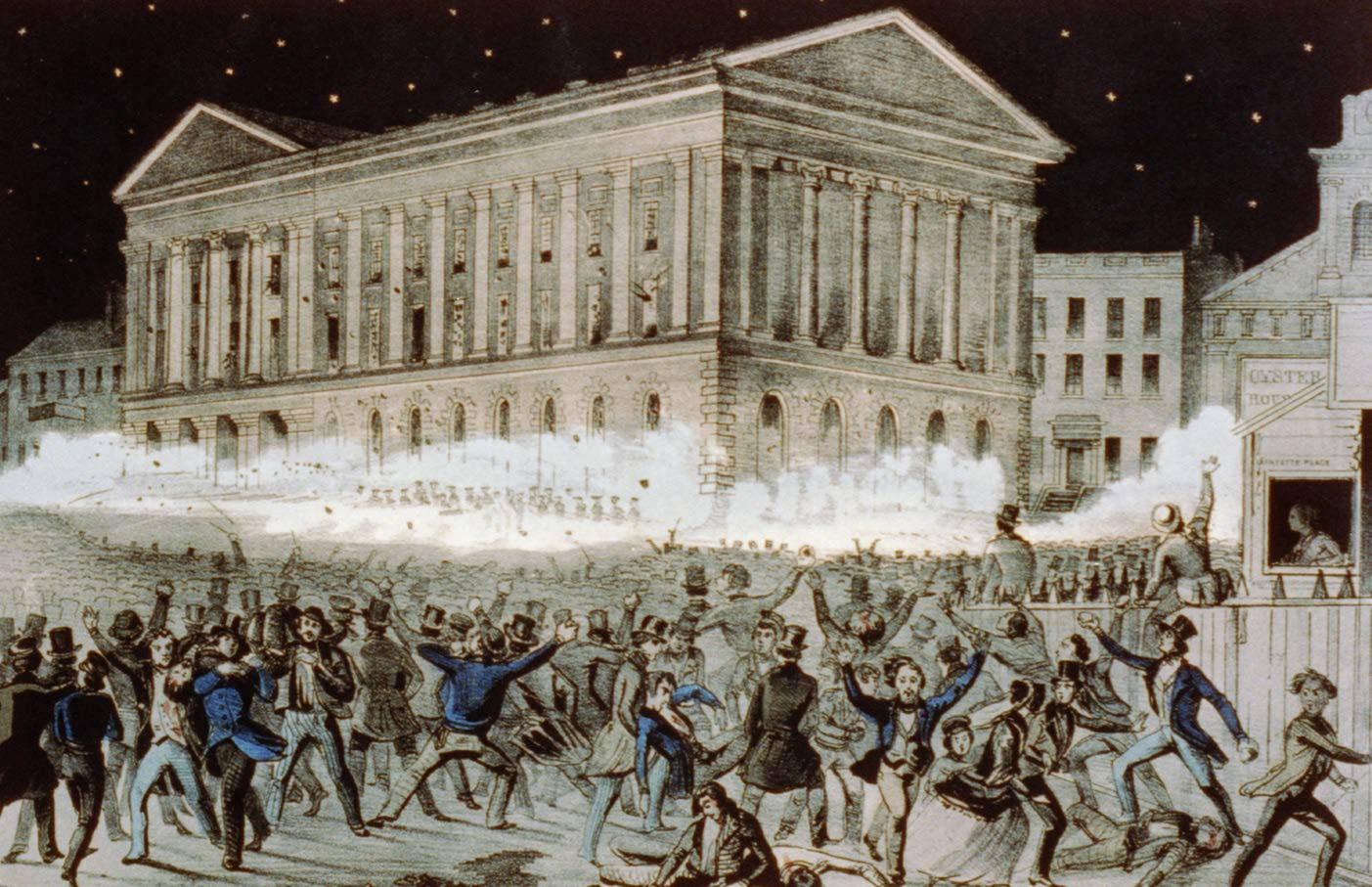May 10, 2014
In theory, I don’t care for rioting, unless it was just for aesthetic reasons. The Astor Place Riot that took place in 1849, started when two famous Shakespearean actors argued who was best to play in the Bard’s plays. American actor Edwin Forrest (1806-1872 and the British actor William Macready (1793-1873) had a running feud, and both were extremely well-known actors in Shakespeare’s theater. Due to this feud, 120 were injured, and at least 25 were killed in this riot. This was the first time that in an American riot where a state militia was called in, and they actually shot into a crowd.
In the mid-nineteenth century, it was the British who dominated the American theater, and Edwin Forrest was one of the first American actors to do major roles in Shakespeare’s plays. Eventually, what was a difference of opinion regarding to input one’s culture into another, became a huge subject matter for Americans. Over time, the American theater scene started to resent the Briitsh influence over their own national theater. Over time, British actors who were touring in America had it rough with the American audience. Shakespeare in America went through every class in America during the nineteenth century. It seemed that the great populace was super aware of his work, and often various groupings would recite his work to each other, as well as his work being very much part of the pop culture of that time.
Macready and Forrest were once friends, but became enemies when the argument reached a feverish pitch in the American and British media. Forrest challenged Macready directly, by following his tour in America and doing the same plays, to show the audience who is a better actor in Shakespeare's plays. When Forrest went to London, to see Macready play “Hamlet, ’ he hissed at the British actor from his seat in the audience. Macready commented that Forrest 'lacked taste." When Macready came to America for another tour, he faced hostility from the audience. There was even a report that someone in the audience threw the carcass of half a dead sheep on the stage, while he performed on stage. Around the same time, Forrest proceeds with a divorce against his British wife for immoral conduct, but the verdict came down against Forrest on the same day that Macready came to New York City.
What is set-up here is a major difference between the British and American sensibility, especially in New York City. Forrest was quite popular with the gangs of New York, where he performed Shakespeare at the near-by Bowery Theater, which catered to a working-class audience. The Astor Place Opera House was built for the upper-class who didn't want to associate themselves with the lower or middle-class theater audience. Shakespeare appealed to both classes, but Forrest gave it an "American" spin, while Macready did of course, a more British subdued style. Either by chance or design, on the same night and the same play, "Macbeth," Macready had his performance at the Astor Place Opera House, and Forrest did his "Macbeth" at the Bowery Theater, a couple of miles away. During Macready's performance, a group of fans of Forrest, purchased tickets to the upper balcony of the theater and threw rotten fruit towards the stage while he performed. Meanwhile at the Bowery, when Forrest recited Macbeth's line "What rhubarb, senna or what purgative drug will scour these English hence,?" the crowd stood up and roared their approval.
When Macready appeared for his next appearance at the opera house, the riot exploded. There were at least 10,000 people outside the theater. About 21 to 31 rioters were killed and approximately 48 were wounded. At least 70 policemen were injured as well. Nevertheless, during the rioting, even as people were trying to burn down the theater, Macready did his full performance and then disguising himself, left and escaped from the crowd. The most interesting observation I have read about the riot is that Sigmund Freud commented that the theater goers "rioted over whether "Hamlet" should be a feminine or masculine character." At this point and time, history hasn't told us yet, regarding that burning question.


























1 comment:
interesting post
me, born (lord of flatbush) life long (in spirit anyway) nyc boy didn't know
makes sense tho, 1848..irish immigrants in hells kitchen..some evil gonna happen..english actor!..harumph
hope to tell you about ur larkspur one day!!
the marin houseboat sinking!??s...hah
cheers
Post a Comment